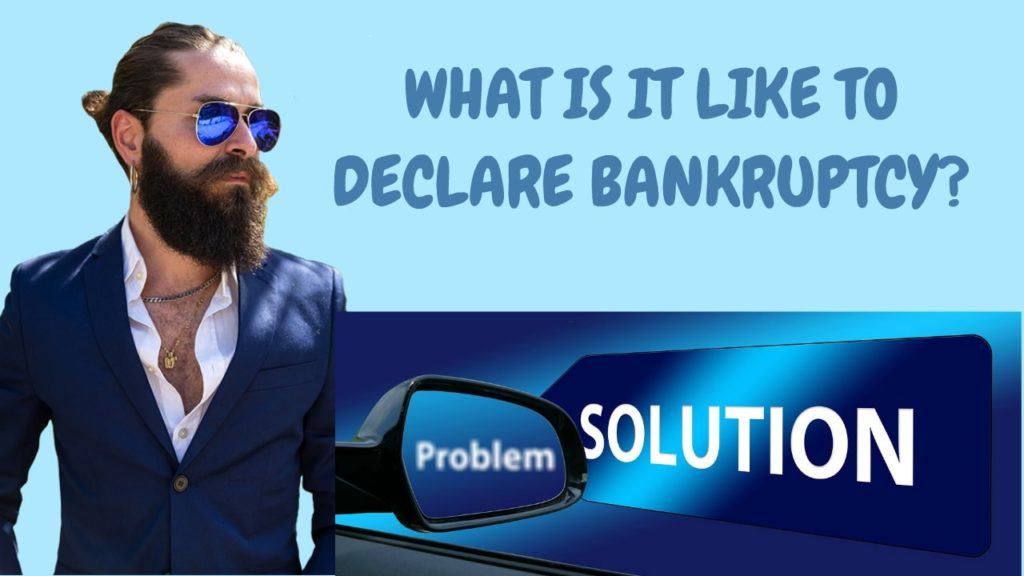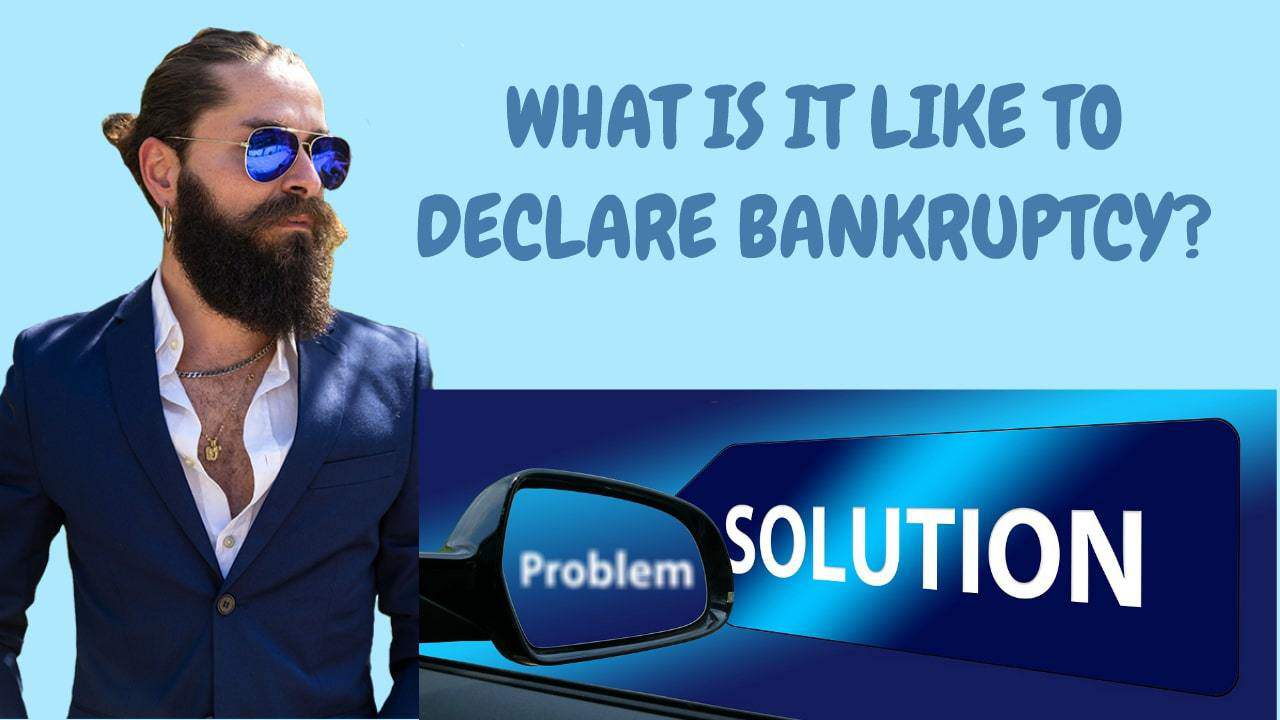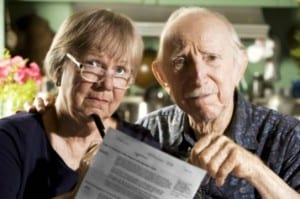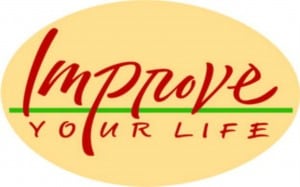The Ira Smith Trustee Team is absolutely operational and Ira, in addition to Brandon Smith, is readily available for a telephone consultation or video meeting. We hope that you and your family are safe and healthy.
What is it like to declare bankruptcy?
What is it like to declare bankruptcy? It is a scary life event, but filing bankruptcy is not as bad or terrifying as the majority of people think. Actually, you have already been through the worst of it before you declare bankruptcy.
If it’s the right option for you, it will get rid of the tension, stress, and anxiety from your life that you have been lugging with you for a very long time. It does not require that much of your time. You will usually have 3 to 4 visits with the licensed insolvency trustee (formerly called a bankruptcy trustee) (Trustee). If all works out, you will never ever see the inside of the bankruptcy court and all your debt will be removed.
The purpose of this Brandon’s Blog is to describe what it is like to declare bankruptcy and what the bankruptcy process is all about.
When to declare bankruptcy
Bankruptcy law exists to help people who have handled an unmanageable amount of debt. Most of the time, it is a result of unforeseen expenses or other unexpected life events that are no fault of the person. Two main examples of such life events are job loss and illness.
Before deciding to declare bankruptcy, make sure to explore all your alternatives, and weigh the benefits and negative aspects of each reasonable option. Part of the no-cost examination we give everyone is doing precisely that; going through the alternatives, taking into consideration the pluses and minuses of each, and making our ideal professional recommendation to every person’s unique scenario.
If you determine that bankruptcy is your only viable alternative as lots of other Canadians do each year remember that the blot on your credit score will not be forever. By using credit properly in the future and paying your debts on time, you can begin to reconstruct your credit rating and put bankruptcy behind you.
To declare bankruptcy, either a bankruptcy restructuring or bankruptcy liquidation likewise assists companies that have unrestrained debt levels. We also offer solutions to companies and businesses searching for debt settlement help.

What are the consequences for a person to declare bankruptcy?
Everyone assumes that if you declare bankruptcy, it takes a massive emotional toll on you. Our experience in working with people we help is the exact opposite. Their financial debts, the fear of not having the ability to pay it off along with the anxiety of the unknown is what is devastating to everyone.
Once people declare bankruptcy, they tell us that the automatic stay of proceedings and the involvement of the Trustee stopping creditors’ collection calls are great benefits. Individuals that file for bankruptcy have already looked over the cliff and feared the worst. When they figure out that their worst worries never happen, and they currently have peace and quiet from collection phone calls, they feel like a weight has been taken off of them. As we tell people, your creditors will certainly now bother the Trustee, not you!
Your bankruptcy is a matter of public record. The Office of the Superintendent of Bankruptcy (OSB) maintains a public database. The Trustee alerts your creditors, Canada Revenue Agency (CRA) as well as the OSB of your filing. People can look up any name they wish for $8 per search. Although it is public, very few people spend money to browse the OSB database. It is mainly for Equifax and TransUnion to place on your credit history report. It is also for the federal government to keep data concerning people and companies that declare bankruptcy in Canada. There are no billboards or flashing neon lights with your name on it for all the world to see.
The most effective repercussion when you declare bankruptcy is that you have the chance to release either all or most of your financial debts and start life once again hassle-free.
How do I declare bankruptcy?
Anybody who is insolvent and owes more than $1,000 qualifies for personal bankruptcy or also known as a consumer bankruptcy filing in Canada. If you are having a problem meeting your financial responsibilities or have actually stopped satisfying them, you remain in financial trouble.
The primary step is to get in touch with a federally licensed Trustee asap to discuss your options. The Trustee will certainly initially collect info from you regarding your assets, liabilities, your household income, and expenses. This allows the Trustee to get a very good understanding of your one-of-a-kind situation.
You and the Trustee will then review your choices. Bankruptcy is just one of the feasible range of options. There are numerous bankruptcy alternatives which include, however, are not restricted to, debt consolidation and consumer proposals.
The Trustee will use the information you gave to prepare the bankruptcy forms. When you declare bankruptcy, of the various bankruptcy files the Trustee prepares, you are signing, and the Trustee is filing what is called an assignment in bankruptcy.
What should I do before I declare bankruptcy?
Many people think there are several things they should do before they declare bankruptcy. Common questions include:
- Should I transfer my interest in the matrimonial home to my spouse?
- When should I transfer the cash in my bank account to my spouse’s bank account?
- Should I stop working or not look for work so that I will not have to make any surplus income payments?
The reality is that by the time you are contemplating bankruptcy, it is too late. The time to do your valid creditor proofing is not when you are insolvent, but when you are solvent! When you are not experiencing any financial problems.
Transferring assets most likely will be successfully attacked by the Trustee. That means that the Trustee will go after the person you have transferred assets to for no or little value. You will not only have protected assets, but you will also have caused your loved one to incur legal costs and have to cough up the assets.
Declaring bankruptcy is an emotional as well as a scary thing. There is only one thing you should do before you declare bankruptcy. You must meet with a Trustee for a no-cost initial consultation and be honest with them. Make full disclosure so that the Trustee can provide you with your realistic options. The Trustee will also fully explain to you what the process will look like and what might happen to you if you declare bankruptcy.
When is bankruptcy a good idea? The answer depends on your situation
Bankruptcy is not naturally negative or excellent, but it is vital for the honest but unfortunate debtor who finds themselves in big trouble with financial debt. Bankruptcy is actually for honest people that have come upon tough times. They need to look to bankruptcy due to the fact that they can’t see a way out. Even the Bible calls for debt mercy at the end of every 7 years (Deuteronomy 15:1).
If you find yourself in a hard financial situation and cannot see a way out, meet with a Trustee. Do not let fears or stereotypes stand in the way of getting the relief and your household need. To declare bankruptcy must be considered as taking a positive step in helping you and your family begin again on the right track.

Is filing bankruptcy bad? Can it be good?
You’ll listen to a great many people effectively say: “bankruptcy is bad”. Yet why? Why is the general consensus that filing for bankruptcy is a negative thing? While it is true that when you declare bankruptcy or a consumer proposal it is evidence of difficulty with your finances, that’s not the whole story.
A large part of the reason that people state bankruptcy is bad is that they do not understand the procedure. No two bankruptcy instances are alike. People are forced into bankruptcy for a whole host of different factors, most of which are outside their control and for that reason, not their fault.
What Happens to a company when it goes to declare bankruptcy?
The BIA regulates exactly how companies can liquidate or restructure and recover from crippling debt. An insolvent company may make use of Part III Division I of the BIA to reorganize its business and try to end up being profitable again. Management remains in place to run the daily activities of the company. Any significant change in the business organization should need to be approved by the Trustee, the bankruptcy court, or both.
Under a pure liquidation bankruptcy filing, the company stops operations and goes completely dark. The Trustee is assigned to sell the firm’s possessions and the money is used to pay for the bankruptcy administration and to make a distribution to creditors. The priority of payouts is governed by the BIA.
Trust claimants and secured creditors are paid first. For instance, secured creditors take less risk due to the fact that the money that they lend is backed by the firm’s assets. If the lender is concerned that the assets may not at any time be enough to fully cover the loan, it will also require additional backup by way of the personal guarantee of the entrepreneur. That personal guarantee can be either an unsecured promise or additional collateral by the entrepreneur pledging personal assets. They do this to limit their risk of loss if the company declares bankruptcy.
Bondholders have a better potential for recovery than shareholders because bonds are a financial debt of the business. The company promises to pay interest on the money it takes in through the sale of bonds. The company also promises to repay the principal according to the terms of the bond issuance.
Shareholders own the company and also take a higher risk. They might make more if the company does well, yet they could lose money if the company is not successful. The shareholders are last in line to be repaid if the company stops working. Bankruptcy laws establish the order of payment.
If I declare bankruptcy, what happens with the CRA garnishee?
If you declare bankruptcy or file a consumer proposal, personal income tax debt is one type of debt in the category of ordinary unsecured debts. When you’ve filed for bankruptcy or a consumer proposal, CRA can’t take any kind of further collection activity against you. This includes wage garnishment or freezing your bank account. Your Trustee will certainly alert CRA once you declare bankruptcy. The Trustee will also advise CRA to quit any type of collection activity against you.
What is it like to declare bankruptcy summary?
To declare personal bankruptcy is a major life event. However, it is a necessary thing to rid yourself of crippling debt. Most people who declare bankruptcy have been faced with a major life event. The main examples are illness, pay cuts, job loss, or divorce. It is not your fault. I hope this Brandon’s Blog has given you helpful information.
Do you have too much debt? Are you in need of financial restructuring? The financial restructuring process is complex. The Ira Smith Team understands how to do a complex restructuring. However, more importantly, we understand the needs of the entrepreneur or the person who has too much personal debt.
You are worried because you are facing significant financial challenges.
It is not your fault that you are in this situation. You have been only shown the old ways that do not work anymore. The Ira Smith Team uses new modern ways to get you out of your debt troubles while avoiding bankruptcy. We can get you debt relief freedom from one of the alternatives to bankruptcy.
The stress placed upon you is huge. We understand your pain points. We look at your entire situation and devise a strategy that is as unique as you and your problems; financial and emotional. The way we take the load off of your shoulders and devise a debt settlement plan, we know that we can help you.
We know that people facing financial problems need realistic lifeline. There is no “one solution fits all” approach with the Ira Smith Team. That is why we can develop a restructuring process as unique as the financial problems and pain you are facing. If any of this sounds familiar to you and you are serious in finding a solution, contact the Ira Smith Trustee & Receiver Inc. team today.
Call us now for a free consultation.
We will get you or your company back on the road to healthy stress-free operations and recover from the pain points in your life, Starting Over, Starting Now.
The Ira Smith Trustee Team is absolutely operational and Ira, in addition to Brandon Smith, is readily available for a telephone consultation or video meeting. We hope that you and your family are safe and healthy.





 CREDIT SCORES ONTARIO
CREDIT SCORES ONTARIO


